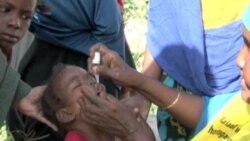The global community came tantalizingly close earlier this year to ridding the world of polio. But then in May, the eradication effort took a powerful blow. The virus turned up again in the Horn of Africa, first in Somalia.
The Banadir region of Somalia, which includes a Mogadishu refugee camp, is thought to be the so-called “engine” of the Horn of Africa polio outbreak.
The Banadir region of Somalia, which includes a Mogadishu refugee camp, is thought to be the so-called “engine” of the Horn of Africa polio outbreak.
In June, three-year-old Mohamed Naasir became ill. His mother, Khadija Abdullahi Adam, said soon after one leg became permanently disabled.
“My son was fine, but he started having a high fever which lasted for almost four days," she explained. "I gave him medicine, but there was no change. The following morning he said to me ‘Mom, I can’t stand up.’”
The virus has spread at a rapid pace, triggering massive vaccination efforts.
Earlier in 2013, polio was confined to three so-called “endemic countries” -- Nigeria, Afghanistan and Pakistan -- where the virus has never been snuffed out. Combined there were fewer than 100 cases in those three countries.
Since the virus re-emerged in the Horn of Africa, there have been at least 160 polio cases in Somalia alone, and the virus has spread to Kenya and Ethiopia.
Genetic analysts suggest the virus sweeping through the Horn of Africa is most similar to the strain found in Nigeria.
Partners working to eradicate polio, such as the World Health Organization, UNICEF and Rotary International, say the virus can spread more easily in Somalia, which has the largest group of unvaccinated children. That’s largely because conflict has kept vaccination crews from being able to reach them. But there are other problems too, according to Rotary International’s Dr. John Sever.
“The problems of being remote, problems of distrust on the part of the families, the problems of communication, the problems of mapping and realizing where these people are and they migrate from one area to another,” Sever said.
Many families are suspicious of outsiders, especially from the West.
So for vaccination crews, it is vital that they work with local government and religious leaders, like Somali Islamic scholar Sheikh Abdulkadir Homhamed Soomow.
“We urge the people of Somalia to be vaccinated. The doctors tell us that polio can kill and it’s harmful to both adults and children,” he said.
Recently, global partners agreed on a five-year plan to end polio once and for all. The intensive effort includes blanketing polio hotspots with vaccination crews, to essentially corner and kill the enemy.
“We’re getting closer, that’s the encouraging part," Dr. Sever said, adding that global partners know what to do and still hope to rid the world of polio by 2015.





